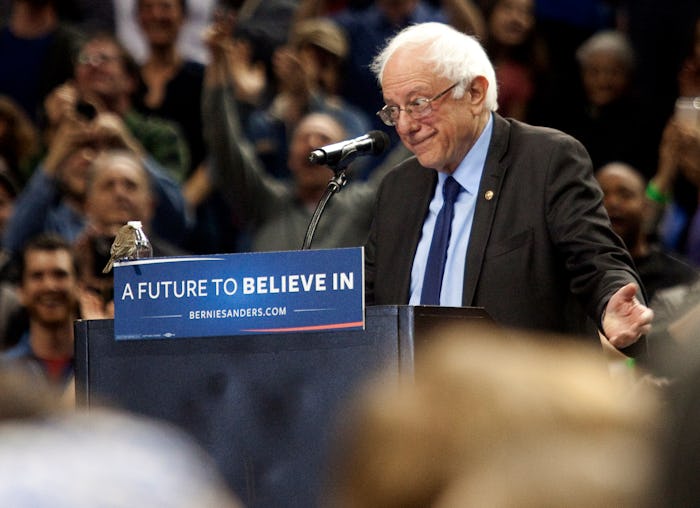News

How Many Delegates Did Bernie Sanders Win In The March 26 Primaries? They Could Be A Huge Help
It has been a good week for Vermont Sen. Bernie Sanders. First, in a move worthy of a Disney princess, he made friends with a bird. Then (and I suppose more importantly, although I'm still hung up on the bird), he routed Former Secretary of State Hillary Clinton in three primary contests. So how many delegates did Sanders win in the March 26 primaries? He did well enough to give his campaign new momentum.
Sanders bested Clinton in Washington, Hawaii, and Alaska, having the best night of his campaign. And unlike in many past victories, he didn't eke out a narrow win, more important for its symbolism than for the delegate count. Nope, in Washington, he won 73% of the vote. In Alaska, he did even better, garnering 82%. And he repeated the feat in Hawaii with almost 70%. Though Alaska and Hawaii aren't hugely delegate-rich states, Washington had 101 delegates up for grabs, making it an important prize on the path to the convention. All in all, the pledged delegate count as of Sunday morning now stands at 975 delegates for Sanders, 1,243 for Clinton.
As the results began to pour in on Saturday night, Sanders spoke to his supporters in Wisconsin, saying, "We have a path toward victory."
Still, that "path toward victory" isn't a happy, level path through a park with lots of adorable animals frolicking nearby. It's more of a sharp climb up the side of an icy mountain. Clinton's delegate lead will be hard to beat. Unlike on the Republican side, which has its fair share of winner-takes-all contests, Democratic primaries award delegates proportionally, so Clinton still managed to garner some delegates from the three states that went for Sanders. And the gap between the two candidates gets even greater once superdelegates are factored in, with Clinton at 1,712 delegates to Sanders' 1,004.
To have a chance of catching up, Sanders will need to win at least 57% of the pledged delegates from here on out, which will be difficult given that upcoming delegate-rich states like Maryland favor Clinton. He'll also have to convince many of the superdelegates already pledged to Clinton to switch their allegiances. But the Sanders campaign has been defying expectations for months now, so it's not impossible. And regardless of whether or not he's able to clinch the nomination, his influence is shaping the Clinton campaign, and the Democratic party, in huge ways. Time reports that, even if he's not the nominee, his advisors are discussing demands they might make at the Democratic convention, like calling on the party to limit the use of Super PAC money in future primary elections.
Wisconsin is the next state to head to the polls, and that won't happen until April 5. So we'll all just have to wait and see if Sanders' newfound momentum will be enough to carry him to victory in that state and beyond.